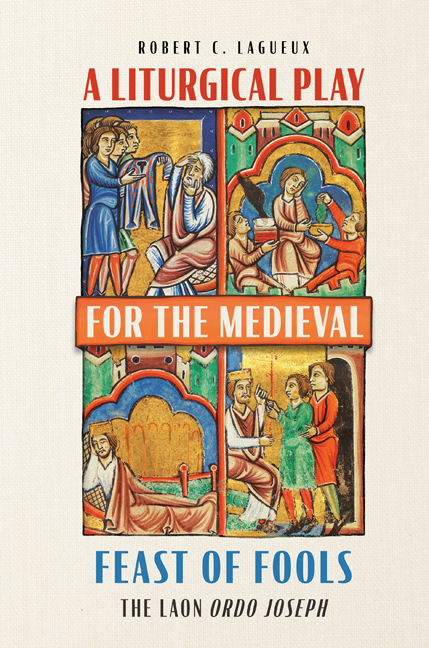The Music of the Ordo Joseph
Published online by Cambridge University Press: 17 December 2023
Summary
Given the evident importance of the Ordo Joseph to the Laon cathedral community, it is surprising – and, for a modern reader, frustrating – that Laon 263 does not record any music for its performance. We cannot know with certainty what music set the text of the play, nor what was used to accompany the processions that are so strongly implied by the rubrics. What is more, the redactors of Laon 263 evidently never intended to include music, for the folios that record the liturgical dramas, including the Ordo Joseph, provide no space for a musical staff. (See Figure 1.) It is clear that this was a conscious decision, however, not an oversight. While very common chants, or chants that appear elsewhere in the source, might be indicated with just a few notes, in general the scribes of Laon 263 demonstrate a propensity for writing items out in full, even chants that feature a high degree of repetition. The redactor of Laon 263, in short, was neither pressed for time nor limited in his supply of vellum. In copying the dramas, the scribe made no effort to save space: elaborated colored initials begin each drama, slightly larger red letters mark the first word after a change in character, rubrics indicating the speaker are written out, and abbreviations are used sparingly.
But the absence of musical notation does not mean that the play was not sung in performance. The question, then, is how to reconcile these two seemingly contradictory facts: the play was surely sung, but there is no music provided for it. What is most plausible is that Laon 263 delib¬erately refrains from providing music for the dramas in order to allow for different music to be used depending on the specific needs and desires of the community at the time of the performance.
This principle was a common one in the High Middle Ages. There are dozens of different musical settings of each of the most popular hymn texts and numerous different texts for the most popular melodies; the settings varied with the seasons, the community that sang them, and the occasion. As Margot Fassler has shown for the Victorines, for example, the melodies chosen to set sequence texts “intensified the particular meanings that the sequences had for the community.”
- Type
- Chapter
- Information
- A Liturgical Play for the Medieval Feast of FoolsThe Laon <i> Ordo Joseph</i>, pp. 125 - 152Publisher: Boydell & BrewerPrint publication year: 2023



